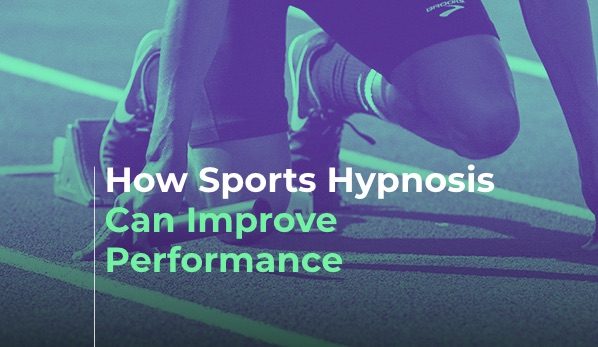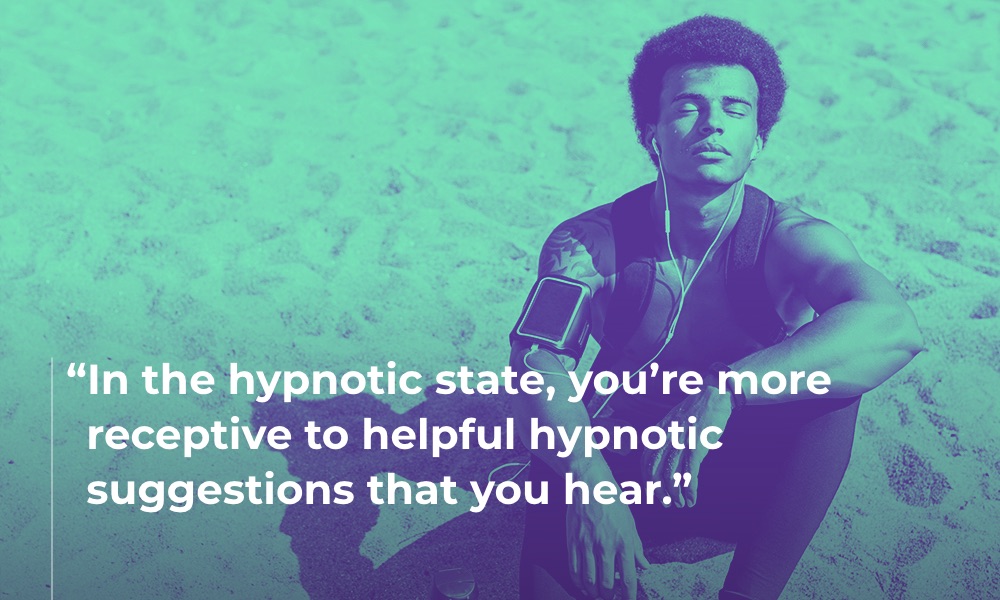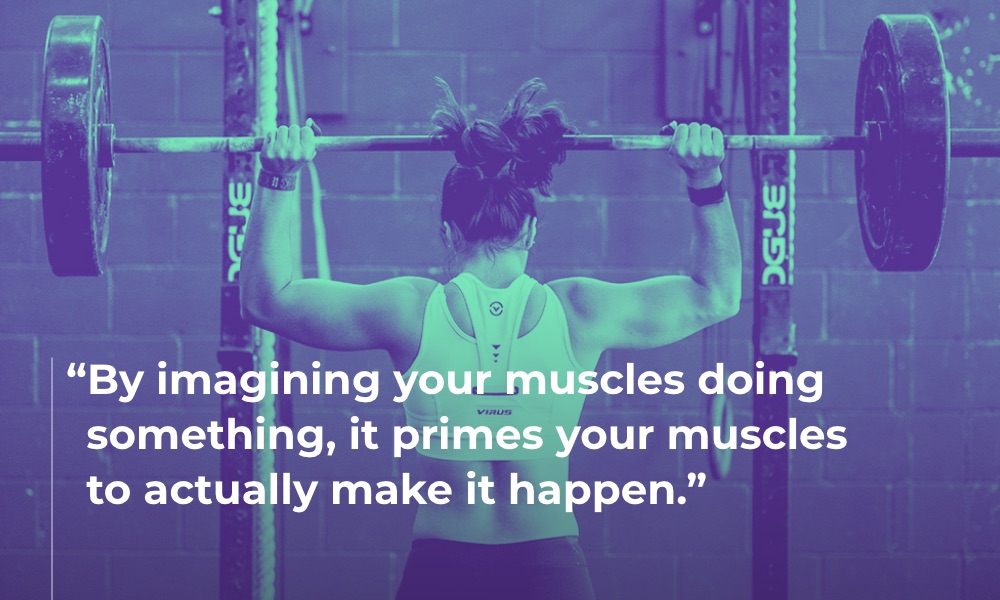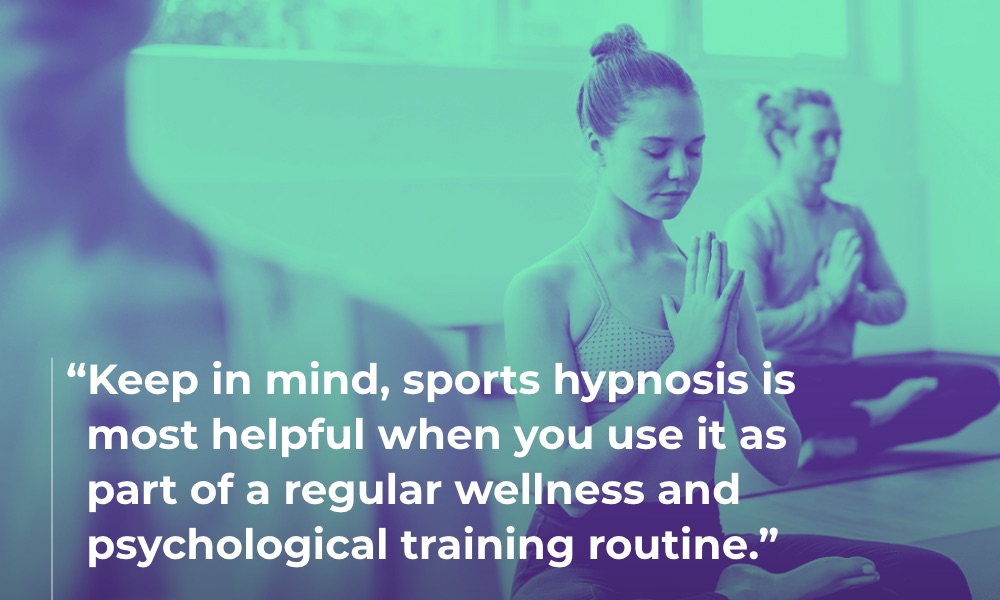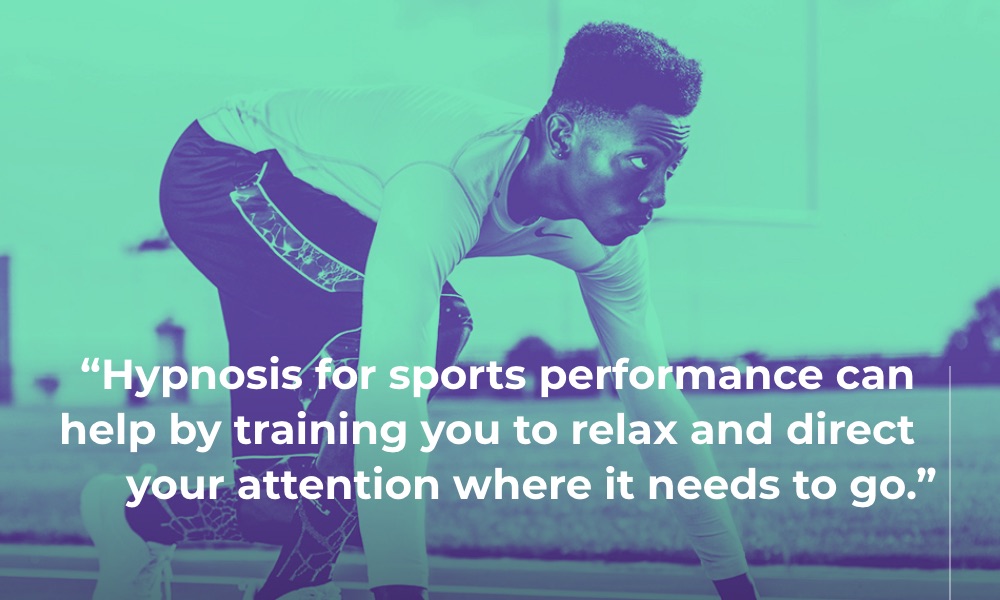No matter what sport you play, it requires a strong mental game. In fact, it likely demands as much mental strength and acuity as it does physical agility. To train and compete in athletics with energy, focus, and confidence, you must be in the right mindset. For this reason, many athletes who want to be at the top of their game (like Tiger Woods, Mike Tyson, Wayne Gretzky, and Michael Jordan) turn to sports hypnosis—with great results!
Sports hypnosis is a type of hypnotherapy that uses hypnosis to help athletes reach their peak performance, and it can help you, too. Even if you’re more likely to play in a neighborhood pickup game than in the big leagues.
In this article, we look at what hypnosis is and how it’s used in sports. Plus, we address some of the common questions and concerns about sports hypnosis. Let’s jump in!
What is Hypnosis?
Before we explore what sports hypnosis is, let’s start by understanding what hypnosis is, in general. You may even be wondering: Is hypnosis real? The answer is yes! And even though pop culture may have left you with an impression of hypnosis as something that’s unusual or mystical, it’s not. Hypnosis is just a state of intense focus and relaxation that primes you to explore your own mind.
Believe it or not, you experience a feeling similar to a hypnotic trance anytime you’re engrossed in a great book or film, or even when you’re driving down the highway. In these states of consciousness, you tend to be relaxed and tuned in to what’s in front of you, just like you are in a hypnosis session.
Also, contrary to popular misconceptions, you’re not asleep or unconscious when you’re hypnotized. But because you are so relaxed and “tuned in,” it’s possible that you’d appear to be asleep to an outside observer.
In the hypnotic trance-like state, you can put your conscious mind on pause and reach your subconscious mind—the part of your mind that holds all of your deeply ingrained beliefs, fears, and behavior patterns. Your subconscious is what motivates nearly everything you do, so when you access it directly, you’re accessing intense levels of motivators. You can identify the subconscious programming that dictates your behavior (and you might be surprised at what you find)! Hypnosis allows you to uncover the mental blocks that are holding you back.
Once you’re in communication with your subconscious, you can begin to make positive changes. You can use visualization and other techniques to show your subconscious what you want to achieve, so you can reach your goals (in sports or otherwise). In the hypnotic state, you’re more receptive to helpful hypnotic suggestions that you hear. During hypnosis, you’re able to ingrain these ideas into your body and mind in a way that you simply can’t in your typical, conscious state.
It’s important to know that nobody who hypnotizes you can control you or force you to do anything you don’t want to do. (Hypnosis is not mind control.)In fact, the idea that someone hypnotizes you at all is a misconception. A hypnotist can guide you into the state of hypnosis, but it’s your own mind that takes you there. You have to consent to hypnosis for it to work, and in fact it really works the best when you come to it believing that it will work. The most hypnotizable people come to a hypnosis session with an open mind—this improves your suggestibility.
Hypnosis work addresses a variety of conditions. In fact, it’s proven to help with:
- Falling asleep more quickly
- Reducing stress and anxiety levels
- Calming fears
- Improving self-esteem
- Having better control over your mindset
- Focusing better
- Treating Irritable bowel syndrome (IBS)
- Mitigating hot flashes
- Managing pain (even pain during childbirth)
- Treating depression
- Smoking cessation
- Weight loss
And not only does hypnosis help you eliminate things you don’t want from your life, but it can also help you cultivate positive traits. For example, hypnosis can help you:
- Break bad habits like procrastination
- Increase motivation and concentration
- Improve self-esteem and self-confidence
- Reduce worry and stress levels
- Improve mental and physical performance and
- Enhance memory and creativity
Of course, you can also use it to find success in sports. In fact sports people and professionals have been incorporating hypnotism into their training programs for years with great success. Even entire sports teams (like the Chicago White Sox) have been known to have a hypnotist on hand when things get serious! And why not?
Hypnosis is a powerful tool that can help break through mental barriers! So let’s explore how you can use hypnosis in sports.
What is Sports Hypnosis?
Sports hypnosis can help you unlock higher levels of your performance, no matter where your sport lands in the field of sports. Hypnosis knocks down your mental roadblocks, enhances your focus, and mentally prepares you to bring your A-game.
After all, physical sports are mental, too. Top athletes regularly use the creative part of their brains to mentally practice their sport and envision possible scenarios during the game. And many performance coaches train athletes how to envision their best possible performance. They’re mentally preparing for success before they ever hit the field, court, rink, or pool.
Hypnosis takes this to the next level by helping athletes (like you) vividly visualize and feel their best plays at a core, functional level. In fact, sports hypnosis can even be used for training. By imagining your muscles doing something, it primes your muscles to actually make it happen.
Sports hypnosis can also help you:
- Envision yourself succeeding during your sport
- Decrease stress and anxiety before, during, or after a game
- Train yourself with better eating habits to fuel your athletic performance
- Reinforce your athletic goals and make them feel more achievable
- Learn to manage anger during your sport.
- Overcome mental barriers that prevent you from performing at your best
- Replace negative thoughts with positive ones before, during, or after a game
- Boost your overall motivation
Types of Sports Hypnosis
A sports hypnotherapist can use a variety of different hypnosis techniques to help you improve your game. Here are a few you might experience:
Revivification
Revivification hypnosis helps you relive a positive sports memory. It could be a memory of a sports success or a time when you exercised strong willpower. The goal of this sports hypnosis technique is to help you develop the ability to remember those feelings and utilize them when you need them.
Dynamic Mental Imagery
Dynamic mental imagery hypnosis helps you develop a mental symbol that represents success in your sport. You can then recall the symbol whenever you want to achieve success. An example of this mental symbol could be hitting a home run. When you want to invoke successful feelings, you envision the home run.
Non-Awareness set
This method works by redirecting your focus to something that isn’t relevant (like the room’s temperature). By shifting your mental awareness to something irrelevant, your body is free to do what it was trained to do without you overthinking it.
Visualization
Visualization hypnosis helps you envision yourself succeeding in your sport. You visualize the success until you can truly feel it. You can use this feeling to motivate you and give you confidence while you’re performing your sport.
Addressing Mental Barriers and Performance Anxiety
Many athletes don’t need to add anything to their mental state so much as they need to take something away. We all have roadblocks that can deplete our confidence and self-esteem, often at the worst times—like when you’re about to shoot a free throw. Hypnosis shows us what these roadblocks are; it can also help you find the underlying causes of these barriers and eliminate them.
Keep in mind, sports hypnosis is most helpful when you use it as part of a regular wellness and psychological training routine. If you haven’t already, start taking other steps to care for your mental health and physical healthcare. Then add sports hypnosis to the mix.
Using Sports Hypnosis for an Injury
When you’re sidelined by an injury, the toll can be just as mental as it is physical. So, a big part of recovery is keeping your spirits up. Thankfully, hypnosis can also help here. You can use it to help you with pain management.
Plus, it can even help you to practice your sport in your mind, even when you can’t physically practice with your body.
Hypnosis can also help you replace that negative self-talk that pops up during an injury with beneficial, healing self-talk. For example, instead of thinking, “I’ll never get better” you may learn to think, “I’m getting stronger each day.”
A Guided Self Hypnosis for Athletic Performance
If you’re ready to get started with sports hypnosis right now, try our hypnosis audio primer on controlling your mindset at anytime. We also have a “Maximize Your Training” primer available in our app.
Frequently Asked Questions About Sports Hypnosis
If you’re new to using hypnosis for sports, you may have some questions. These are some of the ones we hear most often.
Can Hypnosis Help With Athletic Performance?
The short answer is: Yes, hypnosis can improve athletic performance! Because a large part of athletic performance is mental rather than physical, hypnosis can provide a “mental training routine.” It leads you to stay focused on the game, reduces your performance anxiety, and levels up your skills. It can also help address other factors that may be getting in the way of your best performance. For example, it can help you quit smoking, eat better, and get high-quality rest.
In our interview with English rugby superstar, James Haskell, he mentioned improvement in his physical metrics after starting hypnosis.
Is Hypnotizing Dangerous?
No, hypnosis for sports (or for any other reason) is not dangerous. It’s a natural, drug-free form of meditation with typically zero side effects. Professional athletes like Kobe Bryant, Brittany Bowe, and Shaquille O’Neal have trusted sports hypnosis with awesome results.
How do Athletes Use Self-Hypnosis?
Athletes use self-hypnosis techniques to:
- Envision success in their sport
- Train themselves mentally to be focused and less anxious
- Prepare their muscles to do what they need them to do during the game
- Recover from injuries
- And more!
Using Primed Mind for Sports Hypnosis
For many athletes in top physical condition, they must train their mental state to level up their game. Hypnosis for sports performance can help by training you to relax and direct your attention where it needs to go. This improves your sporting performance by allowing your body to do what it’s trained to do. The use of hypnosis is also an excellent complement to other types of mental healthcare, such as cognitive behavioral therapy or psychotherapy.
Whether you’re a pro athlete or simply a weekend warrior, Primed Mind is a hypnosis app that can help you reach your peak performance. Created by one of the world’s leading mindset coaches (who has worked with athletes like Olympic Bronze Medalist, Brittany Bowe), Primed Mind has all of the elements of a high-quality hypnosis session in an easy-to-use platform that you can access for free!
Try our deep primers to maximize your training, dominate the competition, and cultivate a winning mindset. Get started improving your game today!

